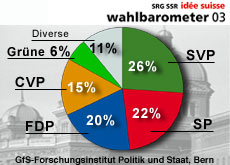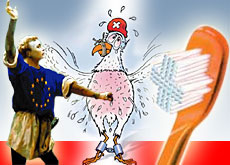Christian Democrats focus on the family
The Christian Democrats – one of the centre-right parties within the Swiss parliament - are hoping that the way to the electorate's heart is through the family.
Although the second largest party in the Senate, the Christian Democrats are trailing behind the other three government parties in pre-election polls.
They have dubbed themselves the “family party” in a bid to attract voters, and are also placing the economy and immigration – two major issues of concern to the electorate – high on their agenda.
The Christian Democrats say they are proud of their multi-thematic approach.
Member of parliament Remo Galli told swissinfo that this characteristic singles his party out from the others.
“If you are a people-focused party, you cannot only have one theme. However, for the election we have reduced our platforms to the family, the economy and the question of foreigners.”
Family matters
For the Christian Democrats, the family is at the core of society. In a statement, it said: “The family is… the true school of life… for every individual.”
Figures quoted by the Christian Democrats show that 46 per cent of people in Switzerland live in a family.
They also claim that living standards drop with the birth of each additional child and 40 per cent of children under 15 are partly unsupervised while their parents work.
The party wants to encourage couples to have families – 30 per cent of which do not – by introducing tax breaks and improved childcare facilities.
The party also supports the creation of paid maternity leave.
Move to the right
Despite placing the family at the heart of their election campaign, the Christian Democrats are accused by the centre-left Social Democrats of having lost their way and abandoned their moderate, centrist position.
Bern university political analyst Andreas Ladner said the party had little choice but to lean towards the Right.
“The Christian Democrats had to move towards the right because the [right-wing] Swiss People’s Party has in recent years edged into their stronghold,” Ladner told swissinfo.
He said the step to the right also put the Christian Democrats more in line with the position of their branches in the cantons.
“A significant proportion of these parties are more conservative than the national party of the Christian Democrats in Bern.”
Migration
Immigration is a prime example of how the Christian Democrats are following a more conservative line: the party says it wants to limit immigration to Switzerland.
It says it wants to minimise migration from countries outside the European Union.
Tighter controls would work, it argues, to help immigrants already resident in Switzerland to integrate better.
The party says its policy on foreigners puts the onus on immigrants to familiarise themselves with Swiss customs and languages.
Bundled up with this is the expectation that an immigrant should learn one Swiss language within a reasonable time. In the case of those who have integrated well, the party believes their path to Swiss citizenship should be as smooth as possible.
The Christian Democrats make it clear that if anyone abuses Swiss hospitality, they cannot expect to enjoy it any longer, according to their new policy of “zero tolerance”.
Economy
Concerning its other top electoral issue, the market economy, the party argues that the sluggish economy could be kick-started by imbuing it with a sense of social awareness.
It wants to make it easier for small- and medium-sized businesses to operate by reducing bureaucracy and introducing more efficient administration.
It also wants to encourage more transparency and improved protection for investors.
Christian, not religious
The Christian Democrats do not consider themselves a “religious” party despite their name, according to Galli.
“I think today we speak more for social responsibility,” he said. Dwindling religiosity among the Swiss has forced the party to face a new reality: “Of course religion is no longer a sure vote for us but we know that religion shaped the past 2,000 years and helped craft a very good social state.”
However, Ladner believes the party can continue with its Christian values, which hold particular sway with the cantons.
“From this point of view, they can go on for years like this.”
For Ladner, the real problem lies with the erosion of support in the major cities and cantons “which are becoming even more important in the way politics and all the discussions in the media are played out”.
Senate power
Nevertheless, despite languishing support, the Christian Democrats are still the second-strongest party in the Senate. This is largely due to the Swiss voting system where cantons are constituencies, and each full canton can send two representatives to Bern. (So-called “half cantons” send one.)
“The Christian Democrats are much stronger in the cantons and they get a bigger share of the seats,” Ladner explained.
One of the crutches propping up the Christian Democrats is their star attraction, Justice Minister Ruth Metzler. But just how effective is the “Metzler effect” in attracting new support?
Ladner believes Metzler, an attractive woman in her late 30s with trademark cropped, black hair, has probably brought some young people to the party.
“But you cannot live on such an effect for years,” the political analyst said.
swissinfo, Faryal Mirza
The latest opinion poll gives the Christian Democrats a 15% share of the vote, behind the People’s Party (26%), the Social Democrats (22%) and the Radical Party (20%).
The Christian Democrats have 35 members in the House of Representatives, out of a total of 200 seats, and 15 out of 46 in the Senate.
In the last election in 1999, the party gained only 15.9% of the vote.
The party has two representatives in the government, Joseph Deiss – the economics minister, and Ruth Metzler – the justice minister.

In compliance with the JTI standards
More: SWI swissinfo.ch certified by the Journalism Trust Initiative



You can find an overview of ongoing debates with our journalists here. Please join us!
If you want to start a conversation about a topic raised in this article or want to report factual errors, email us at english@swissinfo.ch.